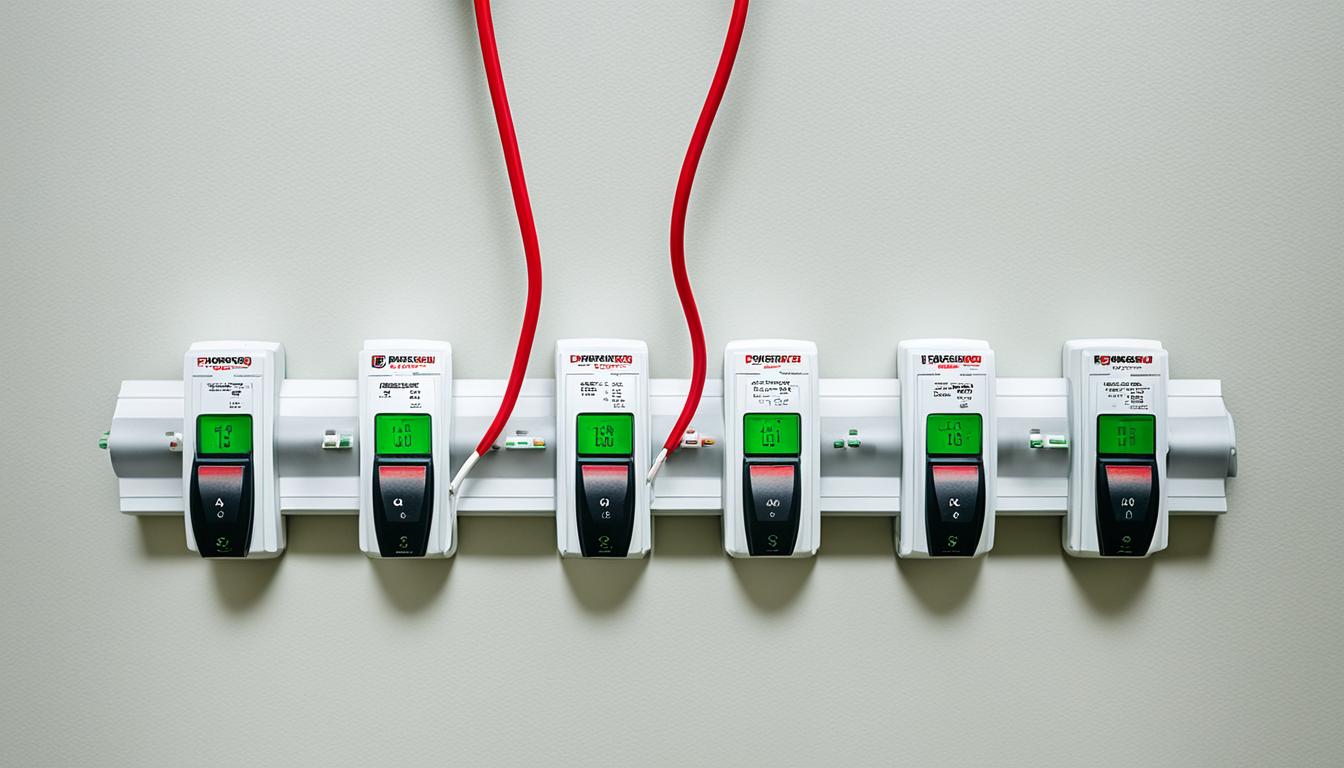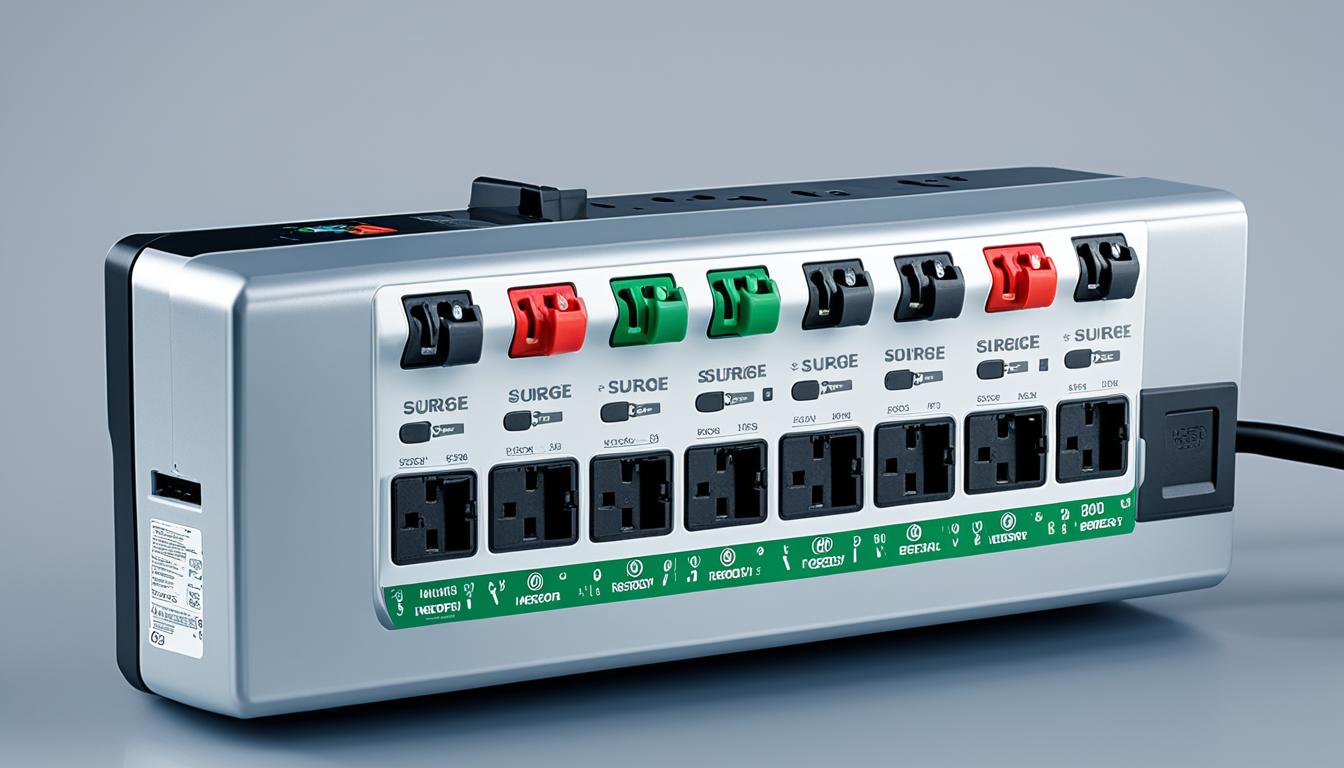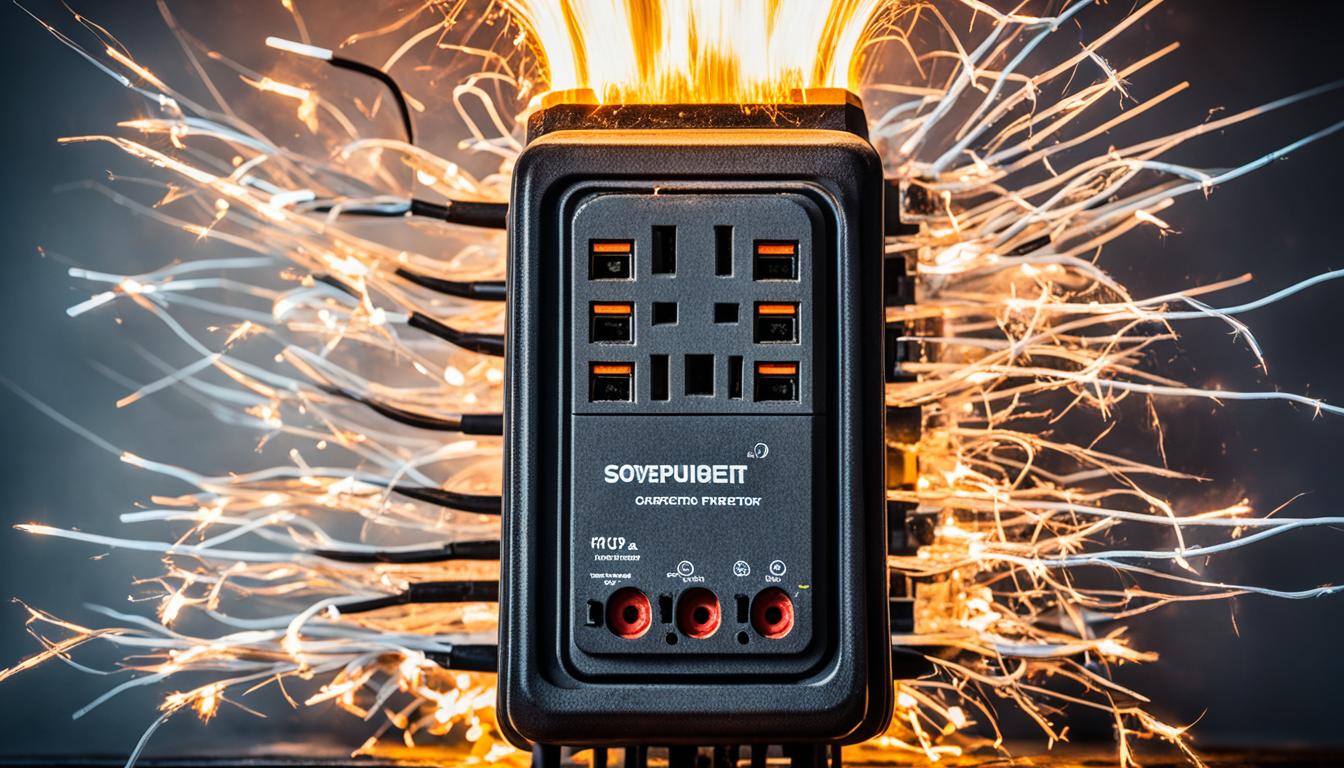extensioncords.site and its partners may earn a commission if you purchase a product through one of our links
Is it safe to plug your refrigerator into an extension cord? This is a common question many homeowners have when trying to find a convenient solution for powering their fridge. While it may seem like a convenient option, using an extension cord with your refrigerator can pose serious safety risks. It’s important to understand the potential dangers and take the necessary precautions to ensure the safety of your home and appliance.
Key Takeaways
- Plugging a refrigerator into an extension cord is not recommended due to fire hazards and potential damage to the appliance.
- Refrigerators require a significant amount of power, and most extension cords are not designed to handle this load.
- Using an extension cord with a refrigerator can cause the cord to overheat and potentially start a fire.
- The voltage drop and increased electrical resistance from an extension cord can strain the refrigerator’s compressor and lead to premature wear and tear.
- It is best to avoid using an extension cord with a refrigerator whenever possible.
The Dangers of Using an Extension Cord with a Fridge
Plugging a fridge into an extension cord can pose significant dangers and risks to both your appliance and your home. Refrigerators have specific electrical requirements that must be met to ensure safe and efficient operation. Using a standard extension cord not designed for heavy-duty appliances like refrigerators can have dire consequences.
When you use an extension cord that is not adequately rated for a fridge, you run the risk of overheating the cord and potentially causing a fire. The power draw of a refrigerator is much higher than that of typical household electronics. The thinner wiring of an extension cord compared to a wall socket can lead to a voltage drop, which can strain the fridge’s compressor and impact its cooling efficiency.
Furthermore, the wiring in an extension cord is more susceptible to damage, increasing the potential for electrical issues. It’s essential to keep in mind that extension cords are not designed for long-term use with heavy appliances like refrigerators. Using an extension cord with a fridge can compromise the safety and longevity of your appliance.
To mitigate these risks, it is crucial to ensure that the extension cord you use with your refrigerator is heavy-duty, adequately rated, and meets the specific electrical requirements of the appliance. Using a heavy-duty extension cord designed for refrigerators reduces the risk of overheating and damage while providing a stable power supply.
The Risks of Overheating and Fire
When you use an extension cord that is not designed for heavy-duty appliances like refrigerators, the cord can overheat due to the high power draw of the fridge. Overheating can lead to melting insulation, potential electrical shorts, and even fires. It’s crucial to prioritize safety by using an extension cord that can handle the power requirements of your refrigerator without overheating.
Impact on Cooling Efficiency
The thinner wiring of an extension cord compared to a wall socket can result in a voltage drop. This voltage drop can strain the compressor of the fridge, affecting its ability to cool effectively. A strained compressor can lead to reduced cooling efficiency, potential food spoilage, and increased energy consumption.
Increased Risk of Electrical Issues
The wiring in an extension cord is more susceptible to wear and tear, increasing the risk of electrical issues. Damaged wiring can lead to electrical shorts, power fluctuations, and potential damage to the connected appliances. By using an extension cord specifically designed for heavy-duty appliances like refrigerators, you can minimize the risk of electrical problems.
| Issues | Risks |
|---|---|
| Overheating | Potential fire hazard |
| Voltage Drop | Compressor strain and reduced cooling efficiency |
| Wiring Damage | Increased risk of electrical issues |
It’s important to prioritize safety and adhere to the proper guidelines when using extension cords with appliances. While using an extension cord with a refrigerator should be avoided whenever possible, if you must use one, ensure that it is heavy-duty, adequately rated, and meets the electrical requirements of your appliance.
Remember
- Using an extension cord not rated for heavy-duty appliances can lead to overheating and potential fires.
- The thinner wiring of an extension cord compared to a wall socket can strain the fridge’s compressor and impact cooling efficiency.
- The increased risk of wiring damage in extension cords can result in electrical issues.
- Opt for a heavy-duty extension cord designed for refrigerators to ensure safe and efficient operation.
Directly plugging your fridge into a properly grounded power outlet is always the safest option. If you have concerns about the electrical setup in your home or need advice on using an extension cord, it is recommended to consult with a qualified electrician.
What to Consider When Using an Extension Cord with a Fridge
If you find yourself in a situation where you need to use an extension cord with your refrigerator, there are several important factors to keep in mind. Considering these factors will help ensure the safety and efficiency of your appliance.
Cord Length
The length of your extension cord is a crucial consideration when using it with a refrigerator. It should be long enough to reach from the power outlet to the fridge without causing excessive tension or strain. Using a cord that is too short can lead to stretching or damage, while a cord that is too long may create a tripping hazard. Measure the distance carefully and choose an extension cord that meets your specific needs.
Cord Gauge
The gauge of your extension cord is another important aspect to consider. The gauge indicates the thickness of the wire used in the cord, with a higher gauge number representing a thinner wire. When using a refrigerator, it’s essential to select an extension cord with a higher gauge number, which means a thicker wire that can handle the power requirements of the appliance. This will help prevent overheating and ensure the safe operation of your fridge.
Safety Rating
When choosing an extension cord for your refrigerator, make sure it is specifically rated for use with refrigerators and meets applicable safety standards. Look for cords that are labeled as heavy-duty and intended for indoor use. These cords are designed to handle the demanding power needs of appliances like refrigerators and are less likely to overheat or pose safety risks.
Proper Placement
Where you place the extension cord is also crucial for electrical safety. Avoid laying the cord across carpets or furniture that could potentially damage the cord’s insulation, as this increases the risk of electrical issues and potential hazards. Opt for a safe location where the cord is protected and away from any potential sources of damage or tripping hazards.
| Considerations | Extension Cord Selection | Rating |
|---|---|---|
| Cord Length | Sufficient to reach without tension | Choose an appropriate length |
| Cord Gauge | Higher gauge for thicker wire | Select a higher gauge cord for refrigerator |
| Safety Rating | Rated for heavy-duty appliances, indoor use | Choose a cord specifically rated for refrigerators |
| Proper Placement | Away from potential sources of damage or tripping hazards | Ensure safe placement of the cord |
By considering these factors and making informed choices, you can safely use an extension cord with your refrigerator when necessary. However, it’s important to note that it is still best to directly plug your fridge into a properly grounded power outlet whenever possible to minimize potential risks and ensure optimal performance.
Why Extension Cords Shouldn’t be Used with Fridges
When it comes to powering your refrigerator, using an extension cord may seem convenient. However, it is important to understand why extension cords should not be used with fridges.
Fridges have high power requirements, and using an extension cord that is not designed for heavy-duty appliances can lead to numerous hazards. The power drawn by a fridge can cause the extension cord to overheat, resulting in cord damage and potentially starting a fire.
A longer extension cord can also impact the performance of your refrigerator, as it can cause voltage drops and reduced power transfer. This can affect the efficiency of the fridge’s cooling system and lead to increased energy consumption.
Furthermore, using an extension cord with a refrigerator can create clutter in your home and pose a tripping hazard. It is always best to directly plug your fridge into a properly grounded power outlet to ensure the safety and optimal performance of your appliance.
Here is a summary of why extension cords should not be used with fridges:
| Reasons to Avoid Extension Cords with Fridges |
|---|
| The high power requirements of fridges can cause extension cords to overheat and pose a fire risk. |
| Longer extension cords can result in voltage drops and reduced power transfer, impacting the fridge’s performance. |
| Using an extension cord with a refrigerator creates clutter and increases the risk of accidents. |
Remember, it is crucial to prioritize safety and adhere to the power requirements for refrigerators. Always consult the manufacturer’s guidelines and consult an electrician if you have any concerns about your fridge’s power supply.
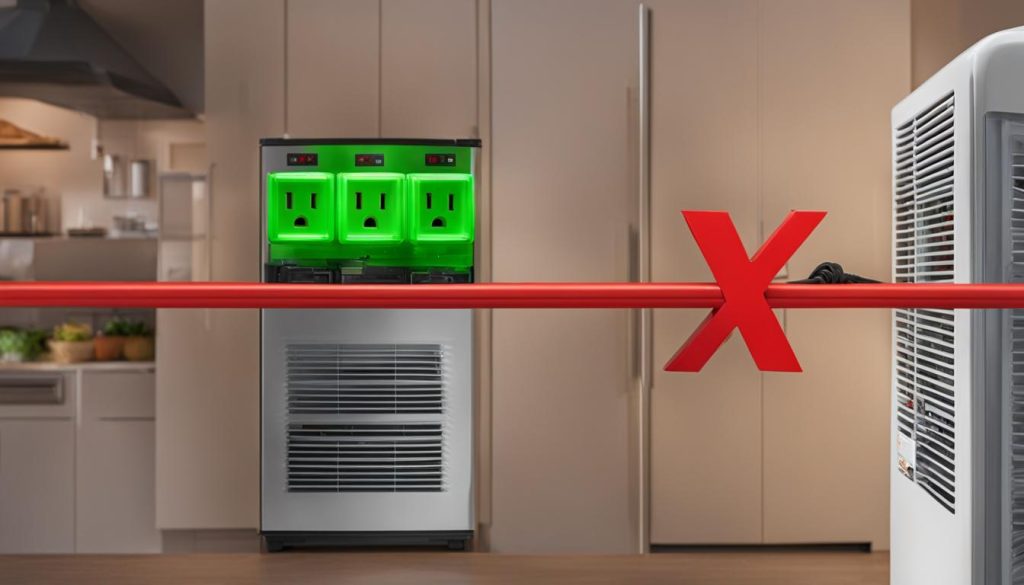
Choosing the Right Extension Cord for Your Refrigerator
When it comes to using an extension cord with your refrigerator, it’s important to select the right one to ensure the safety and optimal performance of your appliance. Consider the following factors when choosing an extension cord for your refrigerator:
- Power requirements: Make sure the extension cord you choose is heavy-duty and rated for the power requirements of your refrigerator. This ensures that it can safely handle the electrical load without overheating.
- Cord length: The length of the extension cord should be appropriate to reach from the power outlet to the refrigerator without excessive tension or strain. Avoid using a cord that is too long as it may result in voltage drops and reduced power transfer.
- Cord gauge: Check the gauge of the extension cord, with a higher gauge indicating a thicker wire that can carry more current. Opt for a cord with a higher gauge to ensure it can handle the power demands of your refrigerator.
By considering these factors, you can choose the right extension cord that meets the electrical safety requirements and power needs of your refrigerator. This ensures the safe and efficient operation of your appliance, minimizing the risk of electrical issues and potential hazards.
| Factor to Consider | Importance |
|---|---|
| Power requirements | High importance |
| Cord length | Medium importance |
| Cord gauge | Medium importance |
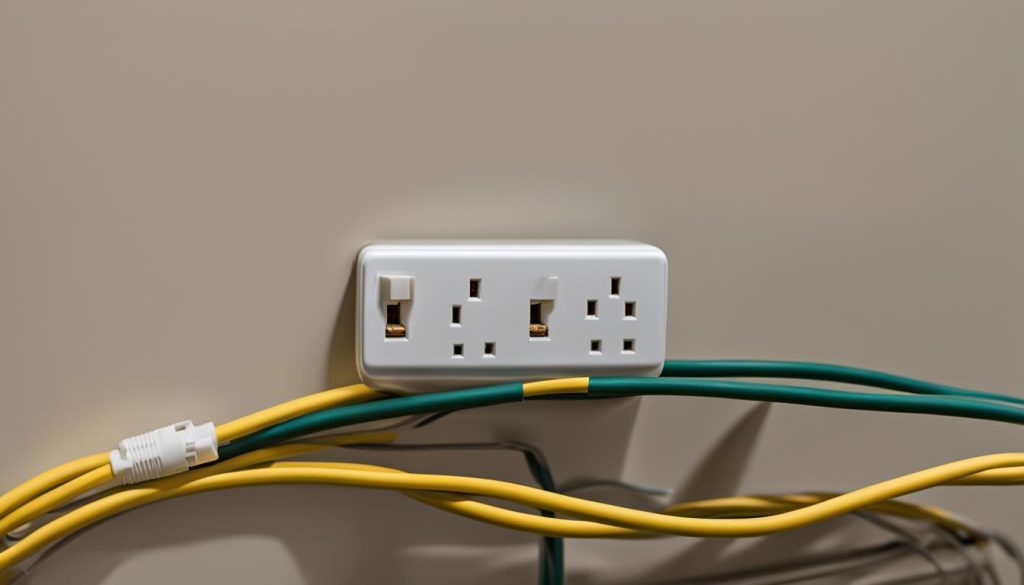
The Importance of Directly Plugging in Your Fridge
When it comes to powering your refrigerator, directly plugging it into a properly grounded power outlet is crucial for safety and reliability. Unlike extension cords, which are not designed for heavy appliances like refrigerators, power outlets are specifically built to handle the high electrical requirements of these essential kitchen appliances. By plugging your fridge directly into a wall outlet, you can ensure a stable and secure power supply, minimizing the risk of overheating, cord damage, and potential electrical issues.
To ensure your refrigerator receives the proper power supply, it is essential to have a standard 3-prong outlet with adequate amperage capacity. This type of outlet is specifically designed to accommodate the electrical requirements of refrigerators and provide a safe and reliable power source. If you’re unsure about the electrical requirements or the suitability of your power outlet, it’s always best to consult an electrician for guidance and assistance.
Opting for a direct plug-in solution eliminates the potential hazards associated with using extension cords, such as overheating and cord damage. Furthermore, it reduces clutter in your kitchen or home and minimizes the risk of tripping and accidents. When it comes to powering your refrigerator, prioritize safety and reliability by directly connecting it to a properly grounded power outlet.
FAQ
Can I plug my refrigerator into an extension cord?
Plugging a refrigerator into an extension cord is not recommended due to potential fire hazards and damage to the appliance. Refrigerators require a significant amount of power to run, and most extension cords are not designed to handle this load. Using an extension cord with a refrigerator can cause the cord to overheat and potentially start a fire.
What are the dangers of using an extension cord with a fridge?
Using an extension cord that is not rated for heavy-duty appliances can lead to overheating, damage to the cord, and potentially causing a fire. The thinner wiring of an extension cord compared to a wall socket can result in a voltage drop, which can strain the refrigerator’s compressor and affect its cooling efficiency. It is crucial to ensure that the extension cord used with a refrigerator is heavy-duty, adequately rated, and meets the electrical requirements of the appliance.
What should I consider when using an extension cord with a fridge?
If you must use an extension cord with your refrigerator, ensure that the length of the extension cord is sufficient to reach from the power outlet to the fridge without excessive tension. Choose an extension cord that is rated for use with refrigerators and is intended for indoor use. Place the extension cord in a safe location, away from carpets or furniture that could damage the cord’s insulation, to ensure electrical safety.
Why shouldn’t extension cords be used with fridges?
Extension cords are not suitable for use with refrigerators due to the high power requirements of these appliances. Fridges draw a significant amount of current, and using an extension cord that is not designed for heavy-duty appliances can lead to overheating, cord damage, and increased fire risk. The length of the cord can also impact the performance of the refrigerator, as a longer cord can result in voltage drops and reduced power transfer. It is always recommended to directly plug a fridge into a properly grounded power outlet.
How do I choose the right extension cord for my refrigerator?
When selecting an extension cord for a refrigerator, ensure that the cord is heavy-duty and rated for the power requirements of the refrigerator. The length of the cord should be appropriate to reach from the power outlet to the refrigerator without excessive tension or strain. Check the cord’s gauge, with a higher gauge indicating a thicker wire that can carry more current. By choosing the right extension cord, you can ensure the safe and efficient operation of your refrigerator.
Why is it important to directly plug in my fridge?
Directly plugging a refrigerator into a properly grounded power outlet is the safest and most reliable option. Power outlets are designed to handle the high electrical requirements of refrigerators, providing a stable and secure power supply. Extension cords, on the other hand, are not intended for long-term use with heavy appliances like refrigerators. Plugging a fridge directly into a wall outlet eliminates the risk of overheating, cord damage, and electrical issues.
